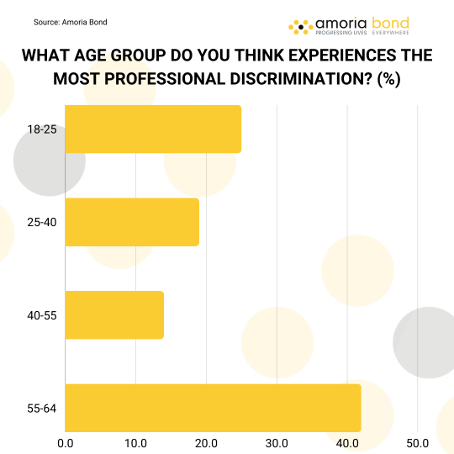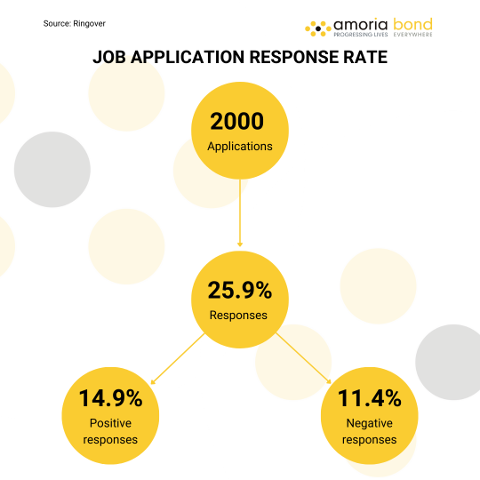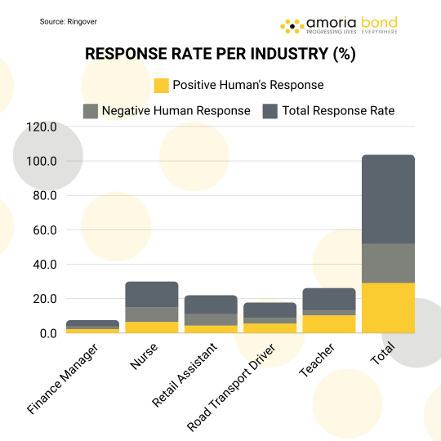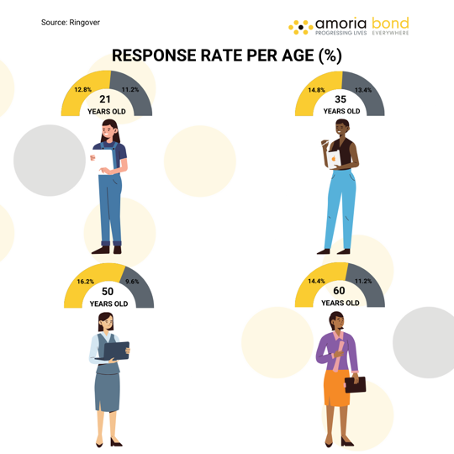‘We’re looking for someone with a minimum of 5 years of experience’ or ‘I’m sorry, but we would like to hire someone with more growth potential’. Does this sound familiar to you?
Although some roles do require experience or flexibility, recruiting someone based on their age is discrimination. Unfortunately, age discrimination happens far too often. Every fifth person in Germany and 11% in the U.K. already have already dealt with discrimination in their career. Although, age discrimination is often towards older people The Guardian stated: “research found that those with a 10% higher than average share of workers aged 50 and over are 1.1% more productive.”
But which age groups experience the most discrimination? The results may surprise you…
What is Age Discrimination?
The U.S. Equal Employment Opportunity Commission defines age discrimination as treating an applicant or employee less favourably because of his or her age. Promoting or demoting someone based on their age is an example of age discrimination. The same applies for training opportunities, job interviews and overall workplace communication. There is also the word ‘ageism’ which is a more specific term for age discrimination against older people.
Different countries and organisations recognise that people of a certain age should be protected. As a result, various laws have been introduced to protect those age groups. Surprisingly, not every country agrees on which age groups should be protected. In the U.S., the Age Discrimination in Employment Act of 1967 only protects applicants and employees over 40. The U.K., on the other hand, has introduced the Equality Act of 2010, which doesn’t specify certain age groups. According to their law, every person who has been treated differently because of their age, has had age discrimination.
The EU has also proposed various directives aimed at protecting both younger and older EU employees from age discrimination. Since 2000, a directive banned age-based discrimination in employment and occupation. In 2008, the EU expanded the law to ensure equal treatment of persons irrespective of age in social protection, education and access to goods and services.
Types of Age Discrimination
How do you know if you or someone else is being treated unfairly? Age discrimination comes in many forms and is recognised in the laws mentioned above. It’s important to note that age discrimination can be legal in certain situations when the employee or employer can prove the discrimination is objectively justified.
For example, for a manual labour job, in which a specific age group is considered vulnerable to injury, that age group could be excluded from applying.
Direct
When an employee or employer denies a person a promotion, training, job, or any other company benefits because of their age, this is the most direct form of discrimination. However, it can be legal in certain circumstances, such as in manual labour roles.
Indirect
When an employer offers a job, training, or promotion but restricts it to a certain age group, such as recent graduates, older employees and applicants are excluded. This type of discrimination is more of a policy or practice that disadvantages certain age groups.
Harassment
When a co-worker makes discriminatory comments or exhibits unacceptable behaviour toward a colleague based on their age, this is considered harassment. Harassment has no objective justification and is, therefore, illegal in all circumstances. However, if a company can demonstrate that it took all reasonable steps to prevent or address age discrimination and harassment, the affected individual cannot make a claim against the company, only against the harasser.
Victimising
An employee is denied a promotion, fair treatment, or a corporate benefit, such as training, because they filed a discrimination complaint or supported someone who did.
How do You recognise Age Discrimination
Although age discrimination can be subtle at times, there are certain patterns or signs to look out for. Here are some examples:
- Promotions usually go to younger people who are sometimes less qualified than their colleagues.
- Only young people are being hired.
- A colleague or employer makes discriminatory remarks.
- Certain colleagues are excluded from major decisions or office activities.
- Older workers are often not chosen for training or promotions because they’re considered "overqualified."
When is Age Discrimination Legal?
Even though age discrimination is illegal and can harm someone’s career and health, there are certain circumstances that can legalize it. A difference in treatment may be lawful if:
- Being part of a particular age group is essential for the job, e.g., a specific role in a movie.
- A company takes positive action to develop and encourage a certain age group when that group is underrepresented or disadvantaged in a role or activity.
- There is an objective justification.
- The difference in treatment falls under the exceptions to anti-age discrimination laws.
- A service provider offers age-related concessions and benefits, e.g., reduced bus tickets.
The circumstances above are only examples of justified age discrimination. The lawfulness of discrimination always depends on the person being discriminated against, their location, occupation, and other relevant factors.
What age groups are most discriminated?
You might think that only people older than 40 experience age discrimination in the workplace, but that’s a myth. Younger people also face discrimination, particularly in terms of job opportunities and corporate benefits, especially recent graduates. But who is most likely to experience age discrimination? To find out, we decided to ask our network for their opinions.
In total 837 people answered our question ‘What age group do you think experiences the most professional discrimination?’. 42% of our LinkedIn network believes that individuals aged 55 to 64 experience the most discrimination. 25% think that young graduates are the most likely to face age-related discrimination. The 25- to 40-year-old age group ranks third, with 19% of respondents identifying them as the most discriminated against. Lastly, 14% believe that people aged 40 to 55 experience the most discrimination.

It’s clear that most people of our LinkedIn network thinks that older employees are being discriminated the most based on their age, but is that true?
Ringover conducted research to determine which age groups have the lowest chances of receiving a positive response to their job applications. To find the answer, Ringover created CVs for four different age groups: a 21-year-old, a 35-year-old, a 50-year-old, and a 60-year-old. These CVs were submitted for five common job roles: finance manager, nurse, primary school teacher, road transport/HGV driver, and retail assistant. For each role, Ringover applied to 100 job postings.
The first key finding of their research was that only 25.9% of all responses came from a human. Of those, only 14.6% resulted in follow-up questions or an interview offer, as illustrated in the following graphic:

Not every job role received the same number of responses. The nurse position had the highest overall response rate, with 15%. [NW2] In contrast, job applications for finance manager roles had only a 3.8% response rate, making it the lowest.
Additionally, gender bias likely played a role in the response rates, as all applicants were female. This could explain why positions like finance manager and road transport driver, which are traditionally male-dominated, received fewer responses.
Response Rate per Industry

Because the finance manager position requires experience, the 60-year-old applicant received three times more positive responses than the 21-year-old. For the nursing job, the 35- and 50-year-olds had the highest chance of receiving a positive response. The 35-year-old also had the highest chance of getting the driver job. Only for the retail assistant position did the 21-year-old have the best chance of getting an interview.
Response Rate per Age
Although most of our LinkedIn network thought that people over 55 experienced the most age discrimination, recent graduates may actually face it even more. According to Ringover’s research, the 21-year-old received only 61 positive responses out of 500 applications (100 per job type), resulting in a positive response rate of 12.2%. The 50-year-old received the highest positive response rate at 16.2%. Although there are differences, the margin between the age groups is relatively small.

The conclusion of Ringover’s research is that young graduates with similar skills and qualifications had the hardest time finding a job. Nevertheless, the effect of age on the likelihood of a positive response was only a maximum of 3.4%. Whether you’re an inexperienced graduate or a seasoned professional, age discrimination can occur in every age group. Therefore, it’s important to recognize and combat age discrimination.
Ringover is not the only entity researching age discrimination. Resume Builder found similar results, with Gen Z experiencing the most discrimination. In their study, 1,000 hiring managers were surveyed about ageism. Interestingly, 36% expressed concerns about hiring Gen Z candidates due to perceived lack of experience, job-hopping tendencies, unprofessional attitudes, unreliability, and work ethic.
People over 60 were also viewed unfavourably by 34% of hiring managers due to concerns about retirement, potential health issues, lack of technological experience, slower work pace, inflexibility, poor social skills, and increased need for time off.
The findings from Ringover and Resume Builder indicate that while older individuals do face significant ageism, Gen Z is actually the age group most likely to be treated unfairly because of their age. However, it’s important to note that the difference in discrimination between Gen Z and Boomers is relatively small, suggesting that both groups experience ageism in comparable ways.
What Can You Do?
That depends on your role. If you are the one experiencing discrimination, you should assess your situation as follows:
- Document the Discrimination: Write down the specifics of the discrimination and identify the individual involved.
- Find the Procedure: Locate the discrimination or complaint procedure for the business or organization in question.
- Inform Your Supervisor or Trusted Person: Report the incident to your supervisor or a trusted individual within your office. If you wish to make an official complaint, you can also submit a written report in accordance with the organization’s policy.
- Seek Internal Resolution: Attempt to resolve the issue internally by requesting a conversation or proposing a solution.
If you are dissatisfied with the internal resolution or seek compensation, you can proceed as follows:
- Review Legal Requirements: Check your country's legislation for deadlines and legal requirements. For instance, in Germany, you must inform the accused person of your demands in writing within two months of the incident.
As a hiring manager you can take action to eliminate age discrimination in your own hiring practices. Review job adverts for bias, checking for wording that might put off certain age groups. Ensure you (or other interviewers) are aware of the rules around age discrimination, and actively look beyond age during the interview process, avoiding questions about length of experience and instead focusing on current skillsets. And certainly don’t ask if they’re capable of “keeping up”!
Like any form of discrimination, these biases can be completely unconscious. But once you’re aware and looking for it, they can often be obvious and easy to avoid. Giving you a more inclusive, more varied, more valuable workforce to progress your business.
Progress Your Life with Amoria Bond
Equity, diversity and inclusion are very important values that we celebrate and champion within Amoria Bond. In our own business we take steps to create an inclusive and positive work culture, and we also support our clients to create open and diverse hiring practices.
Learn how we can work with you to ensure your hiring practices are compliant and equitable, while delivering a diverse range of candidates for every job from our expansive network of specialists. Get in touch with our staffing experts today.
Or if you’re looking for your next job in Technology, Advanced Engineering or Energy, apply to our latest opportunities today.






